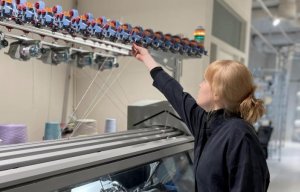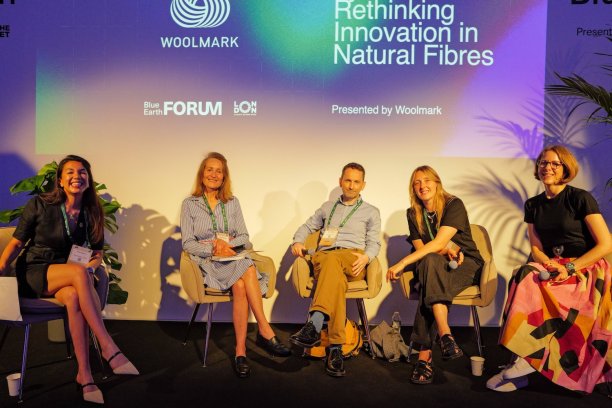
Woolmark Performance Challenge winner immersed in wool
Experts unite at Blue Earth Summit to spotlight regenerative wool’s climate potential.

27th June 2025
Knitting Industry
|
London
At this year’s London Climate Action Week, the Woolmark Company joined forces with Blue Earth Summit to host a high-level panel exploring the future of natural fibres in the fashion industry. Titled Circular by Nature – Rethinking Innovation in Natural Fibres, the discussion drew together farmers, brand leaders, and industry experts to call for greater collaboration and recognition of regenerative wool as a nature-positive solution to the climate crisis.
Moderated by Amy Nguyen, the session brought together panellists Clare Cannon of Woomargama Station in Australia, Chris Gaffney of Johnstons of Elgin, Amy Powney of AKYN, and Woolmark’s Elisabeth van Delden. The conversation moved beyond marketing slogans, grounding the value of wool in science-backed land stewardship, product innovation, and circular design.
At the heart of the discussion was the Woolmark+ roadmap, a strategic framework supporting wool’s integration into resilient, climate-aligned fashion systems. The roadmap prioritises three pillars: accelerating nature-positive production, positioning wool as the circular fibre of choice, and supporting thriving rural communities.
Australian woolgrower Clare Cannon shared firsthand insight into the ecological impact of regenerative grazing practices, noting the return of endangered bird species and native flora to her family’s farm. “Our expertise isn’t theoretical,” she said. “We are restoring biodiversity and reducing emissions – not as buzzwords, but as part of our daily work.”
Cannon emphasised the disconnect between global sustainability frameworks and the realities of natural fibre production. “We’re on the front lines but often excluded from the sustainability conversation. Without proper recognition and financial incentives, more growers will exit the industry.”
AKYN founder Amy Powney echoed this concern: “The real problem isn’t the animals – it’s overconsumption and disconnection from the supply chain. Brands have a role in reconnecting consumers with the origins of what they wear.”
Chris Gaffney, CEO of heritage brand Johnstons of Elgin, highlighted the role of innovation in sustaining legacy businesses. “You don’t become a heritage brand without constantly innovating,” he said, noting strong consumer interest in sustainability.
Woolmark’s Elisabeth van Delden underscored that many global carbon accounting models overlook biodiversity and soil health: “Woolmark+ aims to bridge this gap by helping brands and investors trace real environmental and social outcomes at farm level.”
The panel concluded with a clear message: natural fibres like wool, when grown regeneratively, offer a powerful path toward climate mitigation, rural resilience, and long-term industry stability. But without cross-sector recognition and investment, those benefits – and the growers behind them – may be lost.

Business intelligence for the fibre, textiles and apparel industries: technologies, innovations, markets, investments, trade policy, sourcing, strategy...
Find out more